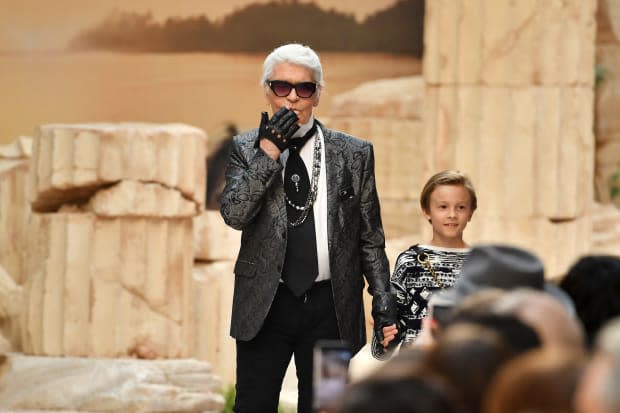Karl Lagerfeld Dies at 85
The legendary designer began his six-decade career as Pierre Balmain's assistant in 1955.

It's a very sad day for the fashion community.
Legendary designer and industry figurehead Karl Lagerfeld — most known for his work as longtime creative director of both Chanel and Fendi, as well as his own namesake label — has passed away at the age of 85. It had been speculated that he was ill after he missed the Chanel Spring 2019 Haute Couture show, but according to sources at WWD, Lagerfeld was working up until the end.
How does the fashion industry mourn the loss of one of its own, a man who has both defined and represented the business for more than half a century? Lagerfeld, a German native, formally began his six-plus decades in fashion in 1955 as Pierre Balmain's assistant, a gig he (awesomely) won after taking home the top prize in the coats category at an International Wool Secretariat design competition. From there, he didn't sit still for long: In 1958, he joined French designer Jean Patou where, for the next five years, he designed 10 haute couture collections under the name "Roland Karl"; according to American fashion journalist Carrie Donovan, his first collection was poorly received. Later, Lagerfeld began to freelance for French brand Chloé in 1964, first designing a few pieces each season before, eventually, designing full collections. In the 1970s, he began collaborating with Roman haute couture house Curiel, as well as Fendi, for which he still serves as creative director.
Lagerfeld began the role that launched him into international celebrity — creative director at Chanel — in the early 1980s, releasing his first collection for the French heritage house for Fall 1983. In his 35-odd years at the helm of Chanel, Lagerfeld paid consistent homage to founder Coco Chanel's iconic, once-revolutionary silhouettes of the 1920s and 1930s while also introducing more current, marketable elements, like the interlocked "CC" monograph, and transforming the company into multi-category blockbuster.
Even in spite of his workload at Chanel, Fendi, Chloé (where he returned from 1992-1997, after which he was succeeded by Stella McCartney) and, of course, his own eponymous line, Lagerfeld took on no shortage of outside partnerships. Those have included Diesel in 2002 and more famously, H&M in 2004, the latter of which ushered in the now-ubiquitous high-low designer collaboration as we know it today. He designed numerous costumes for the theater (such as for the famed La Scala in Milan) and musical performances (from Madonna to Kylie Minogue), while also becoming well-regarded for his photography; in addition to photographing the campaigns for those houses under his creative control, he's also provided editorial work for print publications like V Magazine, Harper's Bazaar and various international editions of Vogue.
Throughout his career, Lagerfeld was also no stranger to controversy, maintaining infamously strong, equally vocal opinions about topics that ranged from religious appropriation to fur to women's appearances (such as Heidi Klum, Pippa Middleton and Adele, the latter of whom he called "a little too fat" in 2012, which prompted an outrage in the U.K. and for which he later apologized) to, more recently, Meryl Streep. More recently, Lagerfeld fell under fire for an explosive interview with French magazine Numéro, in which he discussed such topics as body hair, diet and #MeToo.
Lagerfeld will go down in the fashion history books as one of the most influential, certainly most memorable figures ever to work in design. His signature outfit — often comprised of a white collared shirt, wide black tie, black sport coat and fingerless black leather gloves, his silver hair tied back in a low ponytail — has become an image that's synonymous with Lagerfeld and will forever be a part of the fashion lexicon, just as he will be.
Never miss the latest fashion industry news. Sign up for the Fashionista daily newsletter.